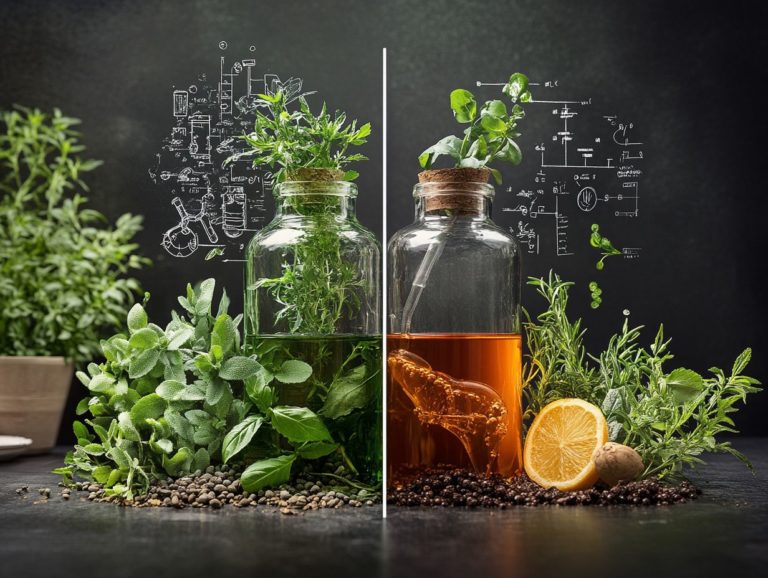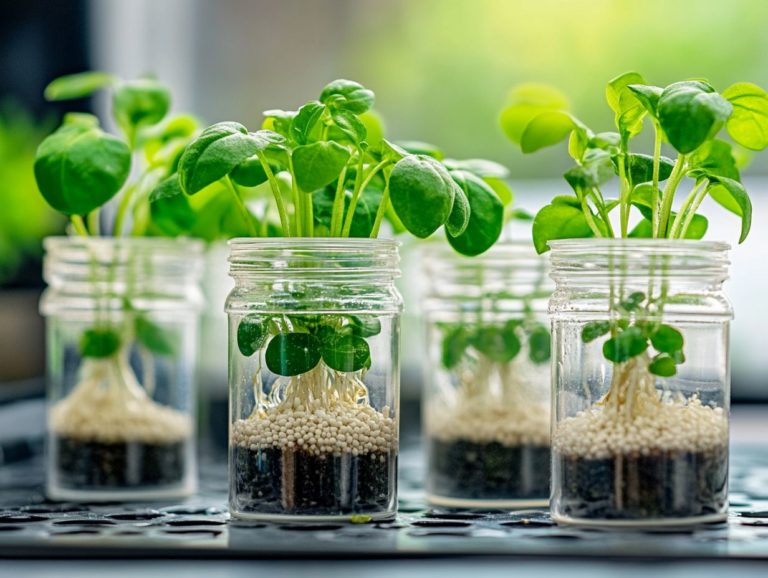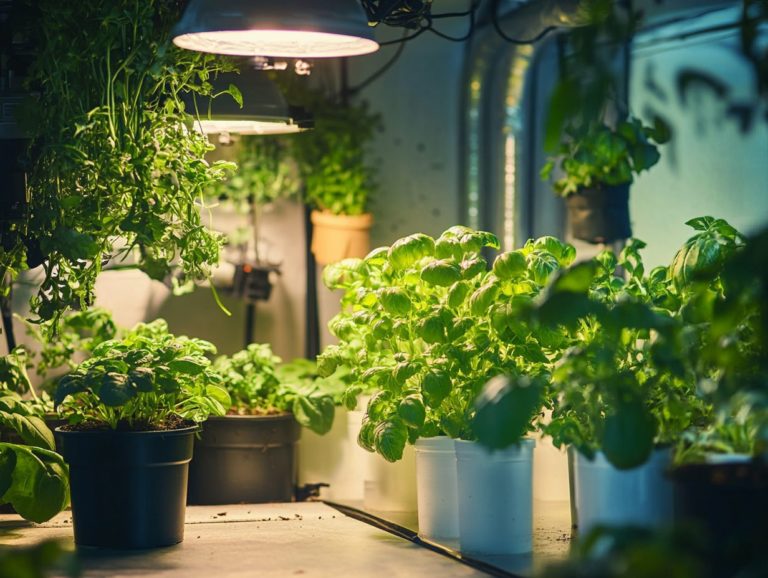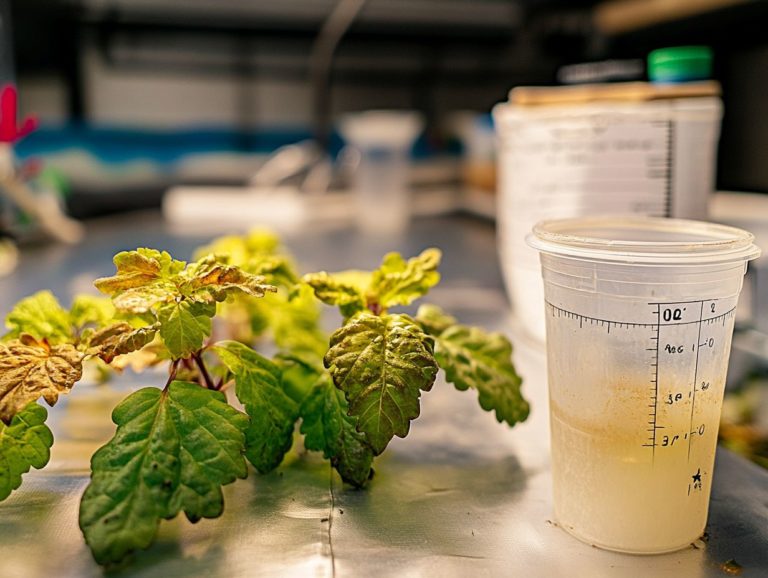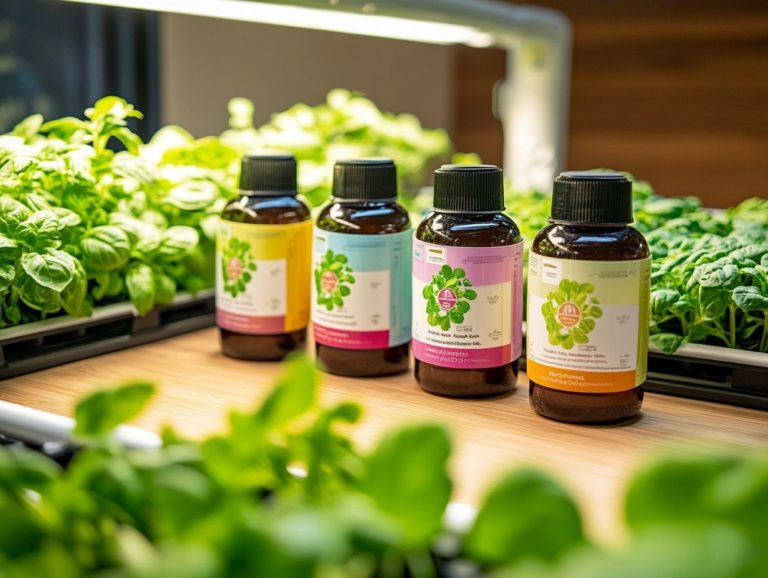5 Hydroponic Nutrients You Shouldn’t Overlook
Hydroponic gardening presents an exceptional opportunity to cultivate vibrant plants without the use of soil. Your success heavily relies on understanding the essential nutrients your crops require.
The five key nutrients Nitrogen, Phosphorus, Potassium, Calcium, and Magnesium are crucial for promoting healthy plant growth.
Learn to recognize nutrient deficiencies, maintain a balanced nutrient solution, and avoid common pitfalls. Whether you’re a seasoned grower or just beginning your journey, mastering these elements will undoubtedly elevate your hydroponic experience.
Contents
- Key Takeaways:
- 1. Nitrogen
- 2. Phosphorus
- 3. Potassium
- 4. Calcium
- 5. Magnesium
- What Are Hydroponic Nutrients and Why Are They Important?
- What Are the Different Types of Hydroponic Nutrients?
- How Can One Ensure Proper Nutrient Balance in Hydroponic Systems?
- What Are the Symptoms of Nutrient Deficiencies in Hydroponic Plants?
- How Can One Adjust Nutrient Levels in Hydroponic Systems?
- What Are Some Common Mistakes to Avoid When Using Hydroponic Nutrients?
- Frequently Asked Questions
Key Takeaways:
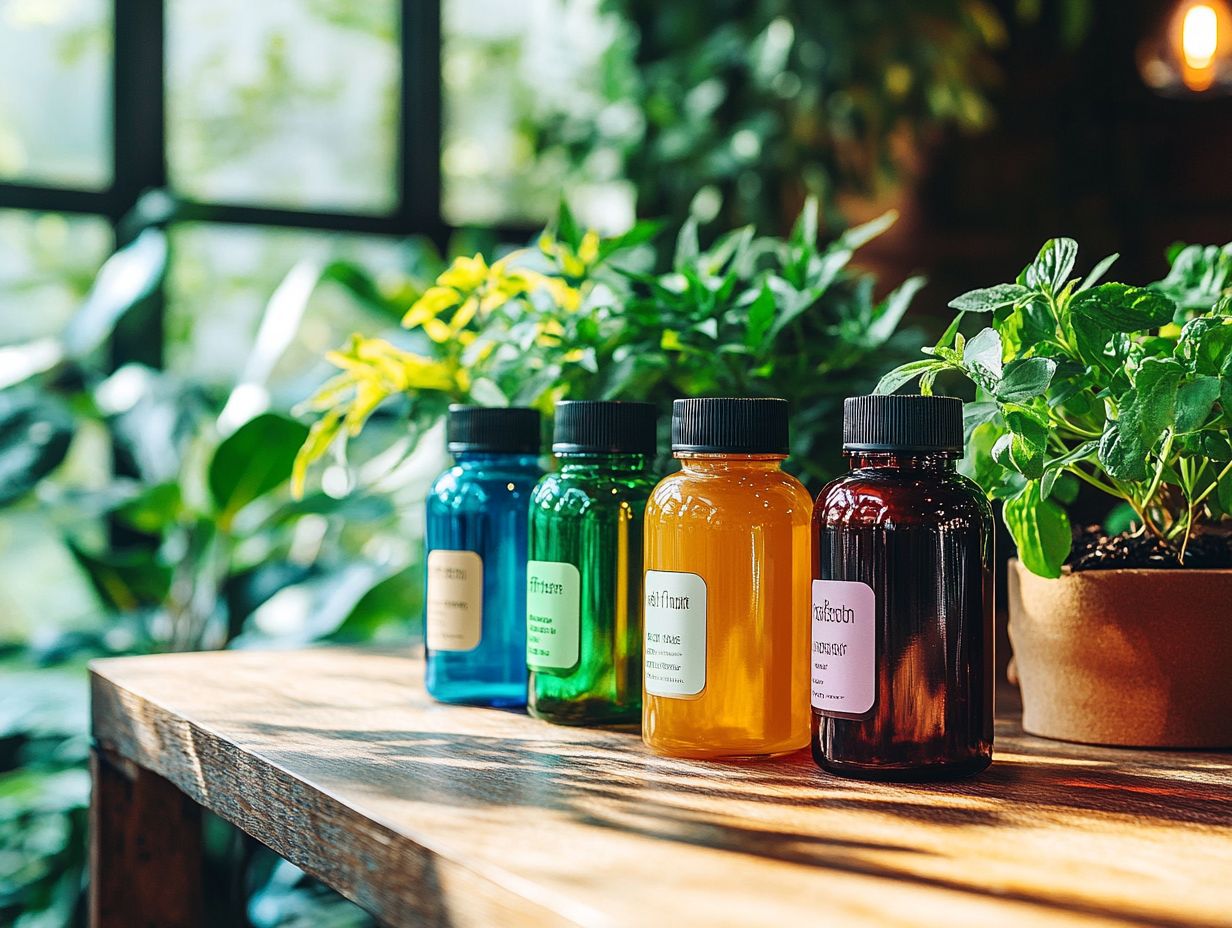
- Don’t overlook nitrogen, phosphorus, potassium, calcium, and magnesium as essential hydroponic nutrients.
- Proper nutrient balance is crucial for healthy hydroponic plants.
- Be aware of nutrient deficiency symptoms and adjust levels accordingly to avoid common mistakes in hydroponic nutrient use.
1. Nitrogen
Nitrogen is an essential nutrient in hydroponic gardening, playing a vital role in your plants’ growth and development. It is key for processes like protein synthesis and chlorophyll formation, ensuring your plants thrive from propagation to harvest time.
This essential element not only promotes vigorous vegetative growth but also influences the overall health and yield of your plants. In various hydroponic systems, such as nutrient film technique (NFT) or deep water culture (DWC), closely monitoring nitrogen levels is vital to avoid deficiencies or excesses.
Common sources of nitrogen you can use include:
- Ammonium nitrate: a fast-acting nitrogen source.
- Calcium nitrate: provides both calcium and nitrogen.
- Urea: a widely used nitrogen fertilizer.
By regularly testing the nutrient solution s pH and the ability of the nutrient solution to carry electricity, you can ensure that nitrogen levels remain optimal. This creates an environment that fosters robust growth and abundant harvests.
2. Phosphorus
Phosphorus is an essential nutrient that plays a pivotal role in the overall health of your plants in hydroponic systems. It directly influences root development, energy transfer, and flowering, all critical for achieving high yields and ensuring a successful harvest.
During the flowering and fruiting stages, phosphorus becomes even more critical. It supports the formation of flowers and the development of fruits, ensuring your plants produce a generous crop with exceptional quality.
To maintain optimal phosphorus levels in your hydroponic setup, regularly test the nutrient waters and adjust the concentration as needed. Make sure to keep the pH in the sweet spot between 5.5 and 6.5 for the best results!
Watch for signs of phosphorus deficiency, which may present as stunted growth, dark green or purplish leaves, and poor flowering. Quickly addressing these issues can save your plants!
3. Potassium
Potassium is essential for your hydroponic plants’ healthy growth. It regulates numerous physiological processes, enhances nutrient solution water quality, and helps plants effectively manage environmental stress.
This vital nutrient plays a significant role in synthesizing proteins, activating enzymes, and facilitating photosynthesis all contributing to robust plant development and higher yields. Without sufficient potassium, your plants may face challenges like poor fruit quality or stunted growth.
To ensure your hydroponic system maintains optimal potassium levels, regularly test nutrient solutions, monitor pH levels, and consider adding potassium-rich fertilizers as needed. Providing a balanced nutrient mix prevents deficiencies, resulting in stronger, more vibrant plants that thrive under various conditions. For more insights, explore innovative nutrient solutions for hydroponics.
4. Calcium
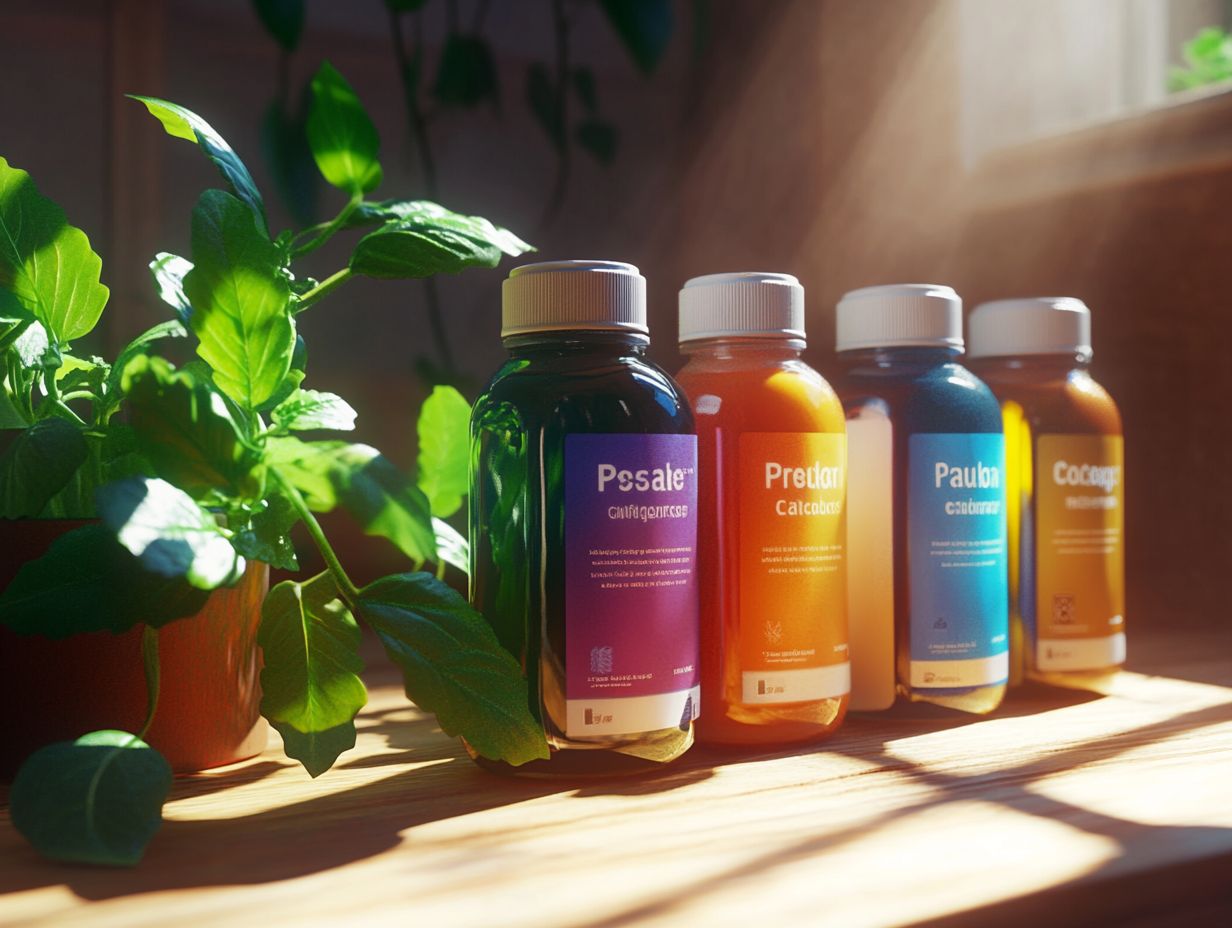
Calcium is an essential nutrient in hydroponic gardening that plays a crucial role in cell wall structure and stability. It ensures your plants develop robustly while preventing issues like stunted growth and nutrient deficiencies during the propagation stage.
Without sufficient levels of this vital mineral, your plants may encounter a host of problems. These include blossom end rot in fruits and poor root development. Make it a habit to test your nutrient solutions often; fluctuations can significantly affect calcium availability.
If you discover deficiencies, don’t worry—there are effective strategies you can employ. Adding calcium nitrate or using specialized plant food can help ensure your plants receive the necessary calcium for optimal health and growth. Additionally, be mindful of common pitfalls by checking out the 5 mistakes to avoid in hydroponic maintenance.
5. Magnesium
Magnesium is essential for your plants, especially in hydroponic systems. It plays a central role in chlorophyll production, crucial for photosynthesis and enabling healthy growth from seedlings to flowering.
This vital mineral supports enzyme functions and helps synthesize important compounds needed for robust roots and abundant yields. To keep magnesium levels in check, regularly test your nutrient solutions with an EC meter, which measures the electrical conductivity of the solution to gauge nutrient levels.
When magnesium levels dip too low, you might notice concerning symptoms in your plants. Interveinal chlorosis is a telltale sign the areas between the leaf veins will turn yellow, causing growth to slow down. Keeping an eye out for these signs allows you to take prompt corrective actions.
By ensuring balanced nutrition, your plants can experience vigorous development.
What Are Hydroponic Nutrients and Why Are They Important?
Hydroponic nutrients are your go-to specialized plant foods that deliver essential minerals and elements crucial for optimal plant growth. This method allows you to provide nutrients directly to your plants in a water-efficient manner, key for achieving high yields and promoting healthy growth in hydroponic systems.
These nutrient solutions typically encompass macronutrients like nitrogen, phosphorus, and potassium, along with micronutrients such as iron, magnesium, and calcium. Each of these components plays a pivotal role in different growth stages. For example, nitrogen promotes vigorous vegetative growth, while phosphorus is essential for robust root development and flowering. To ensure optimal growth, it’s important to understand the essential nutrients for hydroponic success.
Regularly testing your water is essential to maintain the right balance. This enables you to make adjustments like increasing nitrogen for those leafy greens or ramping up potassium for fruiting plants to customize your nutrient solution to perfection. For beginners, considering the top hydroponic fertilizers can enhance the overall success of your hydroponic venture.
What Are the Different Types of Hydroponic Nutrients?
The world of hydroponic nutrients is intricate, divided into macronutrients and micronutrients, each composed of essential components that play critical roles in your plants’ development. These nutrients are essential for crafting a balanced nutrient solution tailored for thriving growth.
Macronutrients like nitrogen, phosphorus, and potassium are essential for promoting healthy leaf growth, robust root development, and vibrant flowering. Don’t overlook the secondary macronutrients such as calcium, magnesium, and sulfur; they also significantly enhance plant health. For a deeper understanding, check out the top 10 nutrient mistakes in hydroponic gardening.
On the flip side, micronutrients might be required in smaller amounts. However, they include essential elements such as iron, manganese, and zinc, crucial for various physiological functions.
To achieve that optimal nutrient balance, utilize nutrient calculators that consider factors like plant type and growth stage. This ensures that each nutrient is accurately measured for effective absorption, helping you maximize your yield and elevate your hydroponic experience.
How Can One Ensure Proper Nutrient Balance in Hydroponic Systems?
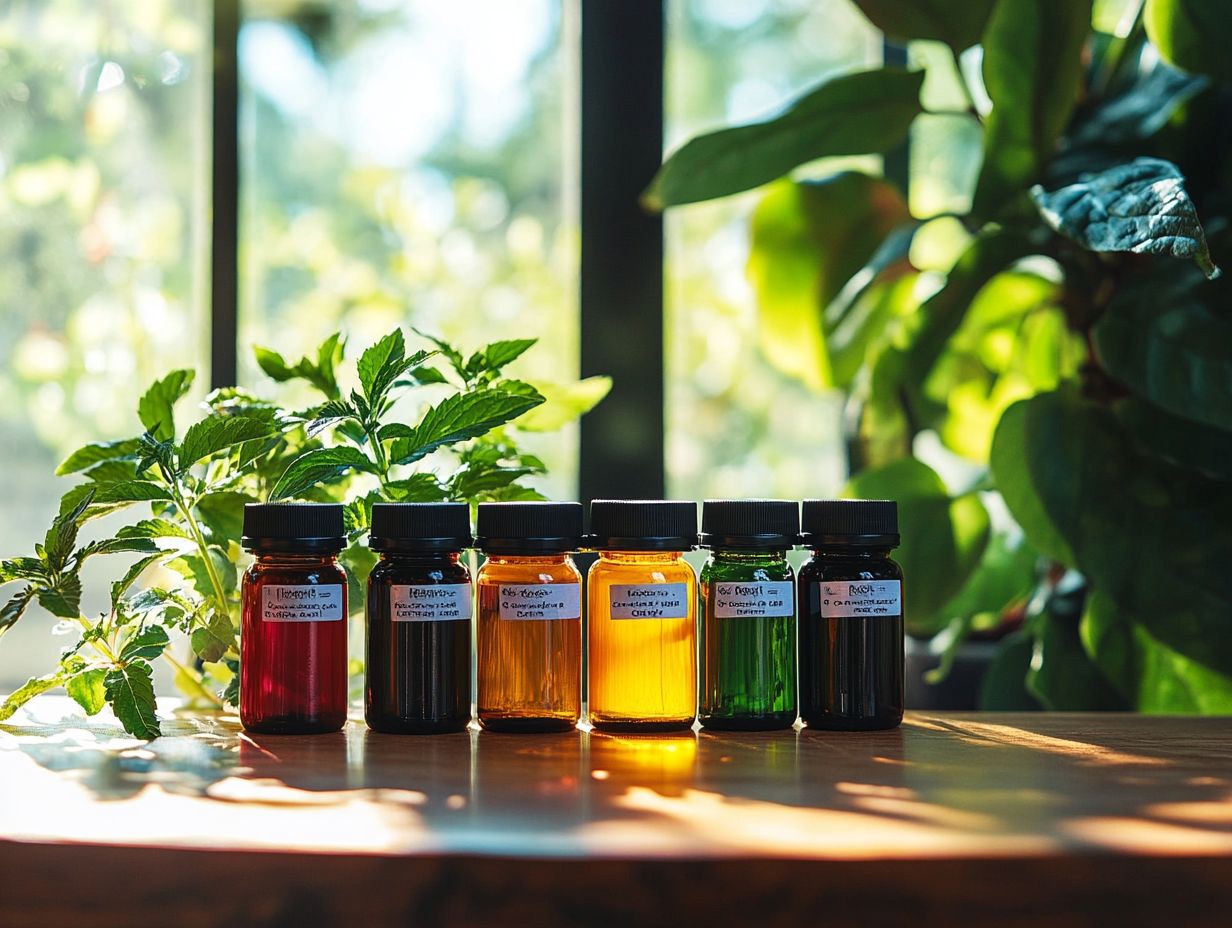
Maintaining a proper nutrient balance in your hydroponic system is vital for achieving optimal plant growth. You can accomplish this by regularly monitoring water quality, adjusting nutrient concentrations, and adhering to best practices for nutrient management.
To ensure your efforts are effective, implement reliable methods for testing water quality using pH meters and conductivity probes. The ideal pH levels for most hydroponic crops typically range between 5.5 and 6.5. This is a critical factor that influences nutrient absorption and overall plant health. For more on this, consider the 5 nutrient tips for hydroponic fruit production.
By consistently monitoring nutrient concentration, you can assess the availability of nutrients for your plants. Regular checks and adjustments foster robust growth and help prevent potential system failures that could lead to crop loss. This underscores the importance of diligent upkeep in your hydroponic practices, as highlighted in our review of popular hydroponic nutrient brands.
What Are the Symptoms of Nutrient Deficiencies in Hydroponic Plants?
Recognizing the symptoms of nutrient deficiencies in your hydroponic plants is crucial for promoting vibrant growth. Signs like stunted development, leaf discoloration, and poor fruiting aren’t just cosmetic issues; they indicate underlying nutrient imbalances that need your immediate attention.
- Nitrogen deficiency: Yellowing leaves, especially in older foliage.
- Potassium deficiency: Browned leaf edges and lackluster fruit development.
- Magnesium deficiency: Yellowing between leaf veins while the veins remain green.
To effectively tackle these deficiencies, consider a balanced nutrient solution tailored to the specific needs of your plants. Regularly monitor nutrient levels and adjust water pH as needed. Incorporate organic fertilizers, like fish emulsion for nitrogen or Epsom salt for magnesium, to significantly elevate your plants’ health.
How Can One Adjust Nutrient Levels in Hydroponic Systems?
Adjusting nutrient levels in hydroponic systems is an essential task that requires your attention to detail. Regularly test the water and nutrient solutions to ensure that your plants receive the precise concentrations necessary for optimal growth and productivity.
Start by using a reliable testing kit to gauge the current nutrient concentrations and pH levels in your solution. Maintaining ideal pH values, typically between 5.5 and 6.5, is crucial, as even slight fluctuations can impact nutrient availability. After testing, make adjustments with pH up or down solutions as needed. For further guidance, check out these 5 must-know nutrient tips for hydroponics.
Use nutrient calculators to determine the appropriate amounts of fertilizers based on the specific crop and growth stage. This helps create a balanced nutrient environment where your plants can truly thrive, as outlined in the 5 key nutrient tips for hydroponic success.
What Are Some Common Mistakes to Avoid When Using Hydroponic Nutrients?
Avoiding common mistakes when using hydroponic nutrients is essential for preventing issues like nutrient deficiencies, system failures, and compromised plant health. These factors can significantly hinder your success in hydroponic gardening.
- Over-fertilization: This can result in nutrient burn and stunted growth. Adhere to recommended guidelines and start with lower concentrations, adjusting gradually.
- Neglecting water quality: Regularly test pH levels and ensure your water is free from contaminants to greatly impact nutrient uptake.
- Poor monitoring practices: Failing to track changes in plant health and nutrient levels can lead to unexpected challenges. Adopt a consistent monitoring routine with regular checks on environmental parameters.
By addressing these common pitfalls, you can mitigate risks and cultivate a thriving hydroponic setup.
Act quickly to correct nutrient imbalances for a thriving garden! Implement these best practices to ensure your hydroponic plants flourish.
Frequently Asked Questions

What are the 5 hydroponic nutrients I shouldn’t overlook?
The five key hydroponic nutrients are nitrogen, phosphorus, potassium, calcium, and magnesium. These nutrients are essential for healthy plant growth.
Why is nitrogen important?
Nitrogen is crucial for plant growth. It helps produce chlorophyll, the green pigment that allows plants to make food from sunlight.
How does phosphorus benefit plants?
Phosphorus supports root development and flowering. It also aids in energy transfer and nutrient absorption within the plant.
What role does potassium play?
Potassium regulates water and activates enzymes that contribute to plant growth. It also boosts plants resistance to disease and stress.
Why is calcium important?
Calcium promotes cell growth and strengthens plant structure. It also aids in nutrient uptake and helps maintain the plant’s pH balance.
How does magnesium contribute to growth?
Magnesium is essential for chlorophyll production, vital for photosynthesis. It also helps produce sugars, which are important for plant energy.

